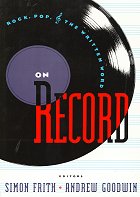 |
 |
 |
 |
![]()
Volume 4,
Issue 3, Spring 2001
|
On Record: Rock, Pop, & the Written Word Simon Frith and Andrew Goodwin, eds.Routledge: London (1990/2000) 512 pages Paperback: $22.95 US |
 } }
|
Reviewed by: Anthony
Hatcher,
Pfeiffer University
Printer-friendly PDF
version
Though published a decade ago, On Record: Rock, Pop, & the Written Word is still relevant and unique. Editors Simon Frith and Andrew Goodwin, popular music writers and university instructors, have gathered forty years of writing about pop and rock music that goes beyond history to theory and analysis.
On Record presents essays dating from the 1950s, when the academic study of pop and rock began in university sociology departments. In the half-century since the first analyses appeared linking rock to the social behavior of the young, according to the editors, the music genre has made the rounds of academic disciplines from Cultural Studies to American Studies to Communication Studies. Rock and pop music lyrics have been examined utilizing literary theory and assorted communication theories, including semiotics. A literal school of Marxist thought, the University of Birmingham's Centre for Contemporary Cultural Studies, spawned writers who studied various youth subcultures and their ass orted uses of music.
The book is not a chronological history, but rather a collection of seminal works in the theoretical study of popular musical culture. These studies have set the tone and the agenda for many that followed. The editors point out in brief introductory sections both the strengths and the shortcomings of the various essays. Some of these shortcomings include dated references, or the consideration of rock culture as a male-only or male-dominated domain. There are counter-arguments, however, including feminist studies, that bring balance to this volume. Each selection is justified by Frith and Goodwin, and the editors themselves turn up as authors in several sections.
The pieces in this book are complete articles that have appeared in academic journals and magazines, mixed with excerpts taken from longer works. The book is divided into eight sections: Groundworks; From Subcultural to Cultural Studies; The Organization of the Music Business; The Creative Process; Musicology and Semiotics; Music and Sexuality; Reading the Stars (a look at performers); and Last Words, allowing music fans a voice. A number of methodologies are used in the studies, showing a progression of sophistication in the more recent pieces. The initial offering was written in 1950 by David Riesman for American Quarterly. Frith and Goodwin point out that Riesman "asked what became the basic sociological rock question: What is the relation between commerce and youth? Riesman gave what became the recurring answer: it depends on the music, it depends on the youth."
In the piece Riesman notes that the functions of music for young people are social in nature, prompting conversation about the music itself rather than its technological processes or its commerciality. His simple methodology included "fifteen long interviews with young people about popular music." The editors compare Riesman's essay with a 1986 piece by cultural studies scholar Lawrence Grossberg. While Grossberg's piece is far more complex, "the stress is still on youth and music, on the use of records as a means of social differentiation."
Language and signs, sexual overtones, creative process, and even business practices are all explored in the context of theoretical practice, and all of these aspects of rock and pop are taken seriously in this book. This is not to say that the writing is devoid of pleasure. Indeed, one of the positive attributes of this collection is that in analyzing a pop culture topic the editors and authors have not wrung the joy out of the subject, as is often the case in treatises on comedy.
Popular culture studies are hot right now. The Popular Culture Association boasts more than 400 paper sessions at its annual conferences. Popular culture scholars examine comic books, cinema, television, and of course, music. On Record offers a scholarly look at a cool and enduring form of music. The book would be a suitable companion for an introductory Mass Communication course, or perhaps as a supplement in Music, Sociology, History, or American Studies.
Back to Top
Home | Current
Issue | Archives | Editorial
Information | Search | Interact